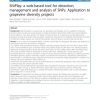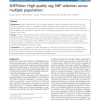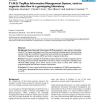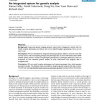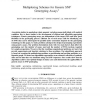158
click to vote
BMCBI
2011
14 years 8 months ago
2011
Background: High-throughput re-sequencing, new genotyping technologies and the availability of reference genomes allow the extensive characterization of Single Nucleotide Polymorp...
134
click to vote
BMCBI
2011
14 years 8 months ago
2011
Background: Linkage Disequilibrium (LD) bin-tagging algorithms identify a reduced set of tag SNPs that can capture the genetic variation in a population without genotyping every s...
BMCBI
2004
15 years 1 months ago
2004
Background: SNP genotyping typically incorporates a review step to ensure that the genotype calls for a particular SNP are correct. For high-throughput genotyping, such as that pr...
119
click to vote
BMCBI
2005
15 years 1 months ago
2005
Background: Single Nucleotide Polymorphism (SNP) genotyping is a major activity in biomedical research. The Taqman technology is one of the most commonly used approaches. It produ...
119
click to vote
BMCBI
2006
15 years 2 months ago
2006
Background: Large-scale genetic mapping projects require data management systems that can handle complex phenotypes and detect and correct high-throughput genotyping errors, yet a...
137
click to vote
BMCBI
2008
15 years 2 months ago
2008
Background: Recent progresses in genotyping technologies allow the generation high-density genetic maps using hundreds of thousands of genetic markers for each DNA sample. The ava...
110
click to vote
BMCBI
2010
15 years 2 months ago
2010
Background: Polymerase chain reaction with confronting two-pair primers (PCR-CTPP) method produces allelespecific DNA bands of different lengths by adding four designed primers an...
124
click to vote
BMCBI
2010
15 years 2 months ago
2010
Background: PCR-restriction fragment length polymorphism (RFLP) assay is a cost-effective method for SNP genotyping and mutation detection, but the manual mining for restriction e...
103
click to vote
PSB
2004
15 years 3 months ago
2004
Association studies in populations relate genomic variation among individuals with medical condition. Key to these studies is the development of efficient and affordable genotypin...
